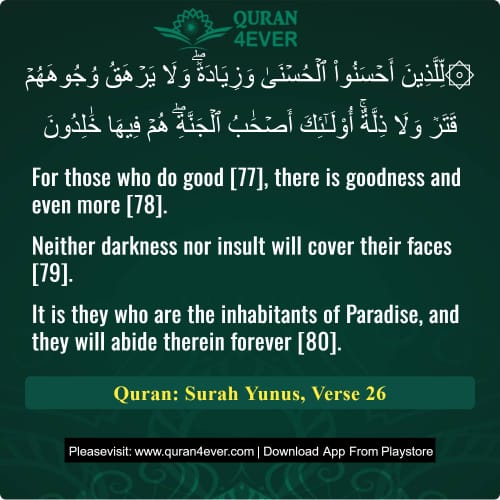
Transliteration:( Lil lazeena ahsanul husnaa wa ziyaadatunw wa laa yarhaqu wujoohahum qatarunw wa laa zillah; ulaaa'ika ashaabul jannati hum feehaa khaalidoon )
"For those who do good [77], there is goodness and even more [78]. Neither darkness nor insult will cover their faces [79]. It is they who are the inhabitants of Paradise, and they will abide therein forever [80]."
The goodness mentioned here refers to faith and piety. Faith is the goodness of the heart, while piety is the goodness of the body, demonstrated through righteous actions. Gratitude in this context could also refer to sincerity in worship. The true gratitude for Allah is to perform acts of worship, such as Salaah, in such a way that it feels as if one is directly witnessing Allah. If this level of consciousness is not possible, then worship should be performed with the thought that Allah is watching you. This demonstrates true devotion and sincerity in worship.
The goodness referred to here is Paradise, while "more" refers to the Divine Vision of Allah, which is not a direct result of a deed but a reward bestowed upon the believers. This Divine Vision is beyond any material reward, reflecting a spiritual reward that exceeds the most profound blessings. It signifies the greatest gift a believer can receive: seeing Allah’s face. In addition to the reward for their good deeds, the believers will experience this eternal blessing.
When Allah wills, the faces of the believers will shine, and the faces of the saints of Allah will glitter. The faces of the Prophets and the special devotees of Allah will be radiant, shining like the sun. The face will become a means of recognition, marking the distinction between the righteous and others.
Those who enter Paradise for the sake of reward will never be removed from it, either through death or any other means. This verse emphasizes that Paradise is eternal for the believers. The reference to Hazrat Adam (AS) and the Me'raj of the Holy Prophet (PBUH) illustrates that some events, such as the entry of the Prophets, were not for material reward but were special acts of divine favor. The Me'raj (night journey) of the Prophet (PBUH) is not contradictory to this verse because it was not for earthly reward, but for divine honor and closeness to Allah.
26. For those who have done good is the best, and even more. Neither darkness nor dust nor any humiliating disgrace shall cover their faces. They are the dwellers of Paradise, they will abide therein forever.
Allah states that those who do good in this world — by having faith and performing righteous deeds — will be rewarded with a good reward in the Hereafter. Allah said:
(Is there any reward for good other than good)(55:60) Then Allah said:
(and even more.) the reward on the good deeds multiplied ten times to seven hundred times and even more on top of that. This reward includes what Allah will give them in Paradise, such as the palaces, Al-Hur (virgins of Paradise), and His pleasure upon them. He will give them what He has hidden for them of the delight of the eye. He will grant them on top of all of that and even better, the honor of looking at His Noble Face. This is the increase that is greater than anything that had been given. They will not deserve that because of their deeds, but rather, they will receive it by the grace of Allah and His mercy. The explanation that this refers to looking at Allah’s Noble Face was narrated from Abu Bakr, Hudhayfah bin Al-Yaman, `Abdullah bin `Abbas, Sa`id bin Al-Musayyib, `Abdur-Rahman bin Abu Layla, `Abdur-Rahman bin Sabit, Mujahid, `Ikrimah, `Amir bin Sa`ad, `Ata’, Ad-Dahhak, Al-Hasan, Qatadah, As-Suddi, Muhammad bin Ishaq, and others from the earlier and later scholars. There are many Hadiths that contain the same interpretation. Among these Hadiths is what Imam Ahmad recorded from Suhayb that Allah’s Messenger recited this Ayah,
(For those who have done good is the best and even more.) And then he said:
(When the people of Paradise enter Paradise, a caller will say: `O people of Paradise, Allah has promised you something that He wishes to fulfill.’ They will reply: `What is it Has He not made our Scale heavy Has He not made our faces white and delivered us from Fire’ Allah will then remove the veil and they will see Him. By Allah, they have not been given anything dearer to them and more delightful than looking at Him.) Muslim and a group of Imams also related this Hadith. Allah then said:
(Neither darkness nor dust shall cover their faces. ..) meaning, no blackness or darkness will be on their faces during the different events of the Day of Judgment. But the faces of the rebellious disbelievers will be stained with dust and darkness.
(nor any humiliating disgrace) meaning, they will be covered with degradation and disgrace. The believers, however will not be humiliated internally or externally, on the contrary, they will be protected and honored. For as Allah has said:
(So Allah saved them from the evil of that Day, and gave them Nadrah (brightness) and joy.) ﴿76:11﴾ meaning, light in their faces and delight in their hearts. May Allah make us among those by His grace and mercy.
(10:26) For those who do good there is good reward and more besides;[33] neither gloom nor humiliation shall cover their faces. They are the people of the Garden and in it they shall abide.
33. That is, Allah by His grace will give to those who did good deeds more than their due reward.
[521]- In addition to the pleasures of Paradise, they will be able to see Allāh (subḥānahu wa taʿālā), as reported in an authentic ḥadīth narrated by Muslim.

For a faster and smoother experience,
install our mobile app now.
Related Ayat(Verses)/Topics